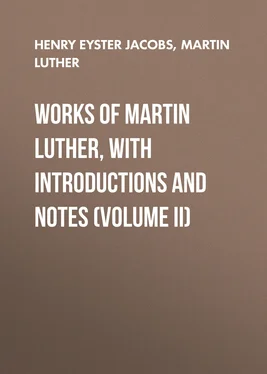Henry Eyster Jacobs - Works of Martin Luther, with Introductions and Notes (Volume II)
Здесь есть возможность читать онлайн «Henry Eyster Jacobs - Works of Martin Luther, with Introductions and Notes (Volume II)» — ознакомительный отрывок электронной книги совершенно бесплатно, а после прочтения отрывка купить полную версию. В некоторых случаях можно слушать аудио, скачать через торрент в формате fb2 и присутствует краткое содержание. Жанр: foreign_prose, foreign_religion, Философия, foreign_psychology, foreign_antique, на немецком языке. Описание произведения, (предисловие) а так же отзывы посетителей доступны на портале библиотеки ЛибКат.
- Название:Works of Martin Luther, with Introductions and Notes (Volume II)
- Автор:
- Жанр:
- Год:неизвестен
- ISBN:нет данных
- Рейтинг книги:3 / 5. Голосов: 1
-
Избранное:Добавить в избранное
- Отзывы:
-
Ваша оценка:
- 60
- 1
- 2
- 3
- 4
- 5
Works of Martin Luther, with Introductions and Notes (Volume II): краткое содержание, описание и аннотация
Предлагаем к чтению аннотацию, описание, краткое содержание или предисловие (зависит от того, что написал сам автор книги «Works of Martin Luther, with Introductions and Notes (Volume II)»). Если вы не нашли необходимую информацию о книге — напишите в комментариях, мы постараемся отыскать её.
Works of Martin Luther, with Introductions and Notes (Volume II) — читать онлайн ознакомительный отрывок
Ниже представлен текст книги, разбитый по страницам. Система сохранения места последней прочитанной страницы, позволяет с удобством читать онлайн бесплатно книгу «Works of Martin Luther, with Introductions and Notes (Volume II)», без необходимости каждый раз заново искать на чём Вы остановились. Поставьте закладку, и сможете в любой момент перейти на страницу, на которой закончили чтение.
Интервал:
Закладка:
In this they should aid the pope and support him, or he is perchance too weak to prevent such an abuse all by himself; or if he were to undertake to defend and maintain this practice, they ought resist him and fight against him as against a wolf and a tyrant, for he has no authority to do or to defend evil. Moreover, if it were ever desired to accumulate such a treasure against the Turks, we ought in the future to have sense enough to see that the German nation would be a better custodian or it than the pope; for the German nation has people enough or the fighting, if only the money is forthcoming. It is with the annates as it has been with many another Roman pretence.
[Sidenote: Papal Months]
Again, the year has been so divided between the pope and the ruling bishops and canons 151 151 The canons are the clergy attached to a cathedral church who constituted the "chapter" of that cathedral, and to whom the right to elect the bishop normally belonged.
, that the pope has six months in the year—every other month—in which to bestow the benefices which all vacant in his months 152 152 This whole section deals with the abuse of the "right of reservation," i. e., the alleged right of the pope to appoint directly to vacant church positions. According to papal theory the right of appointment belonged absolutely to the pope, who graciously yielded the right to others under certain circumstances, reserving it to himself in other cases. The practice of reserving the appointments seems to date from the XII Century, and was originally an arbitrary exercise of papal authority. The rules which came to govern the reservation of appointments were regarded as limitations upon the authority of the pope, The rule of the "papal months," as it obtained in Germany in Luther's time, is found in the Concordat of Vienna of 1448 (Mirbt, Quellen , 2d ed., No. 261, pp. 167 f.). It provides that livings, with the exception of the higher dignities in the cathedrals and the chief posts in the monasteries, which all vacant in the months of February, April, June, August, October and December, shall be filled by the ordinary method—election, presentation, appointment by the bishop, etc.—but that vacancies occurring in the other months shall be filled by appointment of the pope.
. In this way almost all the benefices are absorbed by Rome, especially the very best livings and dignities 153 153 i. e., Church offices which carried with them certain rights of jurisdiction and gave their possessors a certain honorary precedence over other officials of the Church. See Meyer in Realencyk. , IV, 658.
, and when once they fall into the hands of Rome, they never come out of them again, though a vacancy may never again occur in the pope's month. Thus the canons are cheated. This is a genuine robbery, which intends to let nothing escape. Therefore it is high time that the "papal months" be altogether abolished, and that everything which they have brought to Rome be taken back again. For the princes and nobles should take measures that the stolen goods be returned, the thieves punished, and those who have abused privilege be deprived of privilege. If it is binding and valid when the pope on the day after his election makes, in his chancery, rules and laws whereby our foundations and livings are robbed,—a thing which he has no right to do; then it should be still more valid if the Emperor Charles on the day after his coronation 154 154 Charles V, though elected emperor, was not crowned until October 22d.
were to make rules and laws that not another benefice or living in all Germany shall be allowed to come into the hands of Rome by means of the "papal months," and that the livings which have already fallen into its hands shall be released, and redeemed from the Roman robbers; for he has this right by virtue of his office and his sword.
But now the Roman See of Avarice and Robbery has not been able to await the time when all the benefices, one after another, would, by the "papal months," come into its power, but hastens, with insatiable appetite, to get possession of them all as speedily as possible; and so besides the annates and the "months" it has hit upon a device by which benefices and livings all to Rome in three ways:
First , If any one who holds a free 155 155 i. e., A living which has not hitherto been filled by papal appointment.
living dies at Rome or on the way to Rome, his living must forever belong to the Roman—I should rather say the robbing—See 156 156 This rule, like that of the "papal months," is found in the Concordat of Vienna. Luther's complaint is reiterated in the Gravamina of 1521. (Wrede, Deutsche Reichstagsakten , etc., II, 673.)
; and yet they will not be called robbers, though they are guilty of such robbery as no one has ever heard or read about.
Second , In case any one who belongs to the household of the pope or of the cardinals 157 157 Des Papstes und der Cardinale Gesinde , i. e., all those who were counted members of the "family" or "household" (called Dienstverwandte in the Gravamina of 1521) of the pope or of any of the cardinals. The term included those who were in immediate attendance upon the pope or the cardinals, and all those to whom, by virtue of any special connection with the curia, the name "papal servant" could be made to apply. These are the "courtesans" to whom Luther afterwards refers.
holds or takes over a benefice, or in case one who already holds a benefice afterwards enters the "household" of the pope or of a cardinal. But who can count the "household" of the pope and of the cardinals, when the pope, if he only goes on a pleasure-ride, takes with him three or our thousand mule-riders, eclipsing all emperors and kings? Christ and St. Peter went on foot in order that their vicars might have the more pomp and splendor. Now avarice has cleverly thought out another scheme, and brings it to pass that even here many have the name of "papal servant," just as though they were in Rome; all in order that in every place the mere rascally little word "papal servant" may bring all benefices to Rome and tie them fast there forever. Are not these vexatious and devilish inventions? Let us beware! Soon Mainz, Madgeburg and Halberstadt will gently pass into the hands of Rome, and the cardinalate will be paid for dearly enough 158 158 In 1513 Albrecht of Brandenburg was made Archbishop of Magdeburg and later in the same year Administrator of Halberstadt; in 1514 he became Archbishop of Mainz as well. In 1518 he was made cardinal.
. "Afterwards we will make all the German bishops cardinals so that there will be nothing let outside."
Third , When a contest has started at Rome over a benefice 159 159 This rule, like the others mentioned above, is contained in the Concordat of Vienna.
. This I hold to be almost the commonest and widest road or bringing livings to Rome. For when there is no contest at home, unnumbered knaves will be found at Rome to dig up contests out of the earth and assail livings at their will. Thus many a good priest has to lose his living, or settle the contest for a time by the payment of a sum of money 160 160 Cf. The Gravamina of 1521, No. 20, Von anfechtung der cordissanen (see above, p. 88, note 3), where the name cordissei is applied to the practice of attacking titles to benefices. (Wrede, op. cit. , II, pp. 677 f.)
. Such a living rightly or wrongly contested must also belong forever to the Roman See. It would be no wonder if God were to rain from heaven fire and brimstone and to sink Rome in the abyss, as He did Sodom and Gomorrah of old [Gen. 19:24]. Why should there be a pope in Christendom, if his power is used or nothing else than such archknavery, and if he protects and practices it? O noble princes and lords, how long will ye leave your lands and people naked to these ravening wolves!
Интервал:
Закладка:
Похожие книги на «Works of Martin Luther, with Introductions and Notes (Volume II)»
Представляем Вашему вниманию похожие книги на «Works of Martin Luther, with Introductions and Notes (Volume II)» списком для выбора. Мы отобрали схожую по названию и смыслу литературу в надежде предоставить читателям больше вариантов отыскать новые, интересные, ещё непрочитанные произведения.
Обсуждение, отзывы о книге «Works of Martin Luther, with Introductions and Notes (Volume II)» и просто собственные мнения читателей. Оставьте ваши комментарии, напишите, что Вы думаете о произведении, его смысле или главных героях. Укажите что конкретно понравилось, а что нет, и почему Вы так считаете.












